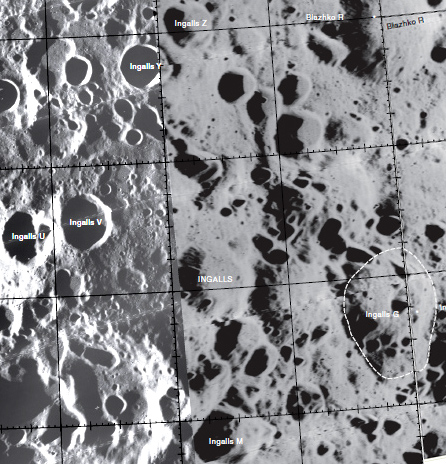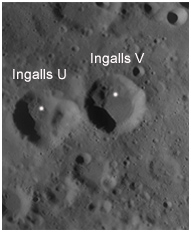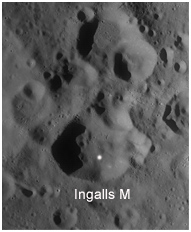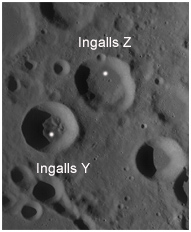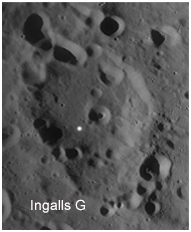Difference between revisions of "Ingalls"
| Line 5: | Line 5: | ||
|} | |} | ||
<div id="toc"> | <div id="toc"> | ||
| − | + | [http://www.lpod.org/coppermine/displayimage.php?pid=4849&fullsize=1 [[Image:normal_ingalls.jpg|external image normal_ingalls.jpg]]]<br /> ''[http://lroc.sese.asu.edu/index.html LROC]'' image WAC No. [http://wms.lroc.asu.edu/lroc/view_lroc/LRO-L-LROC-2-EDR-V1.0/M118499338ME M118499338ME]. Calibrated by [http://ltvt.wikispaces.com/Utility%20Programs#WAC_Viewer LROC_WAC_Previewer].<br /> <br /> | |
| − | |||
==Images== | ==Images== | ||
[http://www.lpod.org/coppermine/thumbnails.php?album=search&type=full&search=Ingalls LPOD Photo Gallery] [http://www.lpi.usra.edu/resources/lunar_orbiter/bin/srch_nam.shtml?Ingalls%7C0 Lunar Orbiter Images] [http://www.lpi.usra.edu/resources/apollo/search/feature/?feature=Ingalls Apollo Images]<br /> <br /> | [http://www.lpod.org/coppermine/thumbnails.php?album=search&type=full&search=Ingalls LPOD Photo Gallery] [http://www.lpi.usra.edu/resources/lunar_orbiter/bin/srch_nam.shtml?Ingalls%7C0 Lunar Orbiter Images] [http://www.lpi.usra.edu/resources/apollo/search/feature/?feature=Ingalls Apollo Images]<br /> <br /> | ||
| Line 21: | Line 20: | ||
* A crater at (or near) the IAU's '''Ingalls''' seems to have been called '''''Morehouse''''' (N° 536) on the [http://the-moon.us/wiki/Sternberg%20Institute Shternberg Astronomy Institute's] ''Second Complete Moon Map - 1969''. Research: Danny Caes. | * A crater at (or near) the IAU's '''Ingalls''' seems to have been called '''''Morehouse''''' (N° 536) on the [http://the-moon.us/wiki/Sternberg%20Institute Shternberg Astronomy Institute's] ''Second Complete Moon Map - 1969''. Research: Danny Caes. | ||
* '''Ingalls''' was once H.P.Wilkins's name for '''Riccioli C'''. | * '''Ingalls''' was once H.P.Wilkins's name for '''Riccioli C'''. | ||
| − | * What appears to be an officially unnamed chaotic-looking large depression southwest of '''Ingalls''' (east of '''Mineur''') looks like a smooth-floored unit on Hans Schwarzenbach's ''Hallwag''-map of the moon's far side. <span class="membersnap">- | + | * What appears to be an officially unnamed chaotic-looking large depression southwest of '''Ingalls''' (east of '''Mineur''') looks like a smooth-floored unit on Hans Schwarzenbach's ''Hallwag''-map of the moon's far side. <span class="membersnap">- DannyCaes <small>Feb 12, 2012</small></span> |
<br /> | <br /> | ||
==Lettered craters== | ==Lettered craters== | ||
| Line 41: | Line 40: | ||
<br /> | <br /> | ||
---- | ---- | ||
| − | + | </div> | |
Revision as of 16:27, 15 April 2018
Contents
Ingalls
| Lat: 26.4°N, Long: 153.1°W, Diam: 37 km, Depth: km, Rükl: (farside) |
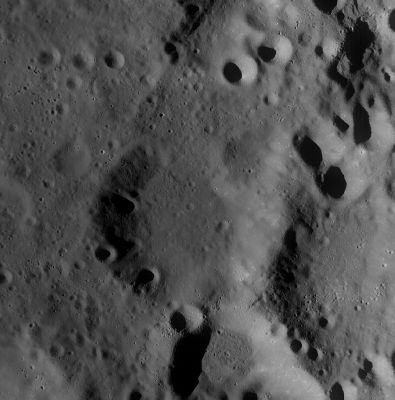
LROC image WAC No. M118499338ME. Calibrated by LROC_WAC_Previewer.
Images
LPOD Photo Gallery Lunar Orbiter Images Apollo Images
Maps
(LAC zone 51B3) USGS Digital Atlas PDF
IAU page
Description
Description: Wikipedia
Additional Information
Nomenclature
- Named for Albert Graham Ingalls (1888-1958), described by the IAU as an "American optician." He is best remembered for hosting the "The Back Yard Astronomer"/"Amateur Scientist" feature in Scientific American from 1928-1955, and for editing the related three-volume Amateur Telescope Making book series.
- A crater at (or near) the IAU's Ingalls seems to have been called Morehouse (N° 536) on the Shternberg Astronomy Institute's Second Complete Moon Map - 1969. Research: Danny Caes.
- Ingalls was once H.P.Wilkins's name for Riccioli C.
- What appears to be an officially unnamed chaotic-looking large depression southwest of Ingalls (east of Mineur) looks like a smooth-floored unit on Hans Schwarzenbach's Hallwag-map of the moon's far side. - DannyCaes Feb 12, 2012
Lettered craters
Left: Mosaic of LACs 51 and 52 - excerpt from the USGS Digital Atlas of the Moon.
Right: LROC WAC images of the lettered craters - (top-left) M118512927ME, (top-right) M118499338ME, (bottom-left) M118499338ME, (bottom-right) M118478987ME. All four images calibrated by LROC_WAC_Previewer (click each for larger views).
LPOD Articles
Bibliography
Albert G. Ingalls in the Sourcebook Project:
- Guns of Seneca Lake (Science, 1934) (Explosive Sounds Heard along Seacoasts and near Large Bodies of Water), see: Earthquakes, Tides, Unidentified Sounds, and related phenomena (William R. Corliss, The Sourcebook Project, 1983).
